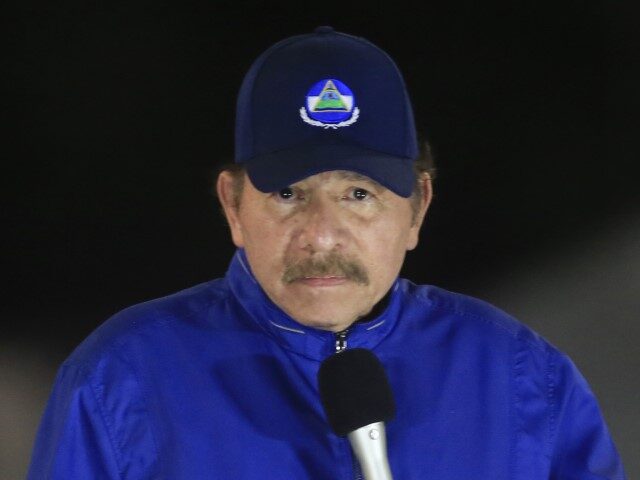Nicaragua’s brutal socialist dictator Daniel Ortega hosted a meeting on Wednesday with Gen. Nikolai Patrushev, secretary of Russia’s Security Council, and several other high-ranking Russian security officials.
Nicaragua signed several security deals with Russia at the meeting to bolster Ortega’s apparatus of repression, which the United Nations blasted for its human rights abuses in a damning report on Thursday.
Ortega, who is styled as a “commander” in his regime’s propaganda releases, billed the “special” meeting with Patrushev as a conference of a “task force” composed of other repressive Latin American regimes, including Cuba, Venezuela, and Bolivia.
Ortega said the participating dictatorships looked forward to advice and training from Russia’s police and intelligence services, as well as economic support from Russia.
Nicaragua’s opposition news website Artículo 66 — which is named after the article of the Nicaraguan constitution that guarantees freedom of speech and is relentlessly hounded by Ortega’s goon squads for exercising that right — feared Ortega and his “Sandinista repressive forces” would “refine their repressive methods in Russia” and obtain new resources for keeping their political adversaries under surveillance.
Artículo 66 noted that, according to Ortega’s son and investment adviser Laureano Ortega Murillo, the agreements signed on Wednesday included a “cooperation protocol” between the Nicaraguan police and Russian interior ministry that will last until at least 2026, and provides for cooperation in “retraining and professional improvement of personnel in the field of police activity.”
Another deal described by Murillo committed the Russian Interior Ministry to help its Nicaraguan counterpart develop “legal regulation of the activities of non-profit organizations.
The U.N. Human Rights Council (UNHRC) received a report from its panel of Nicaragua experts on Thursday that accused Ortega, his wife Rosario Murillo, and his top officials of repressive actions that were “tantamount to crimes against humanity.”
“Violations, abuses and crimes have been perpetrated not only to dismantle active opposition efforts, but also to eliminate critical voices and dissuade, in the long term, any new organization and initiative of social mobilization,” the report said.
UNHRC’s Nicaragua group has been monitoring the abuses of the Ortega regime since 2018 when Ortega’s forces killed at least 300 anti-government protesters and drove over 100,000 into exile.
Ortega has been in power since 2007. He kept it by shutting down thousands of non-governmental organizations (NGOs) and religious groups he saw as a threat, including the Red Cross and even the Boy Scouts.
“Violations, abuses and crimes have been perpetrated not only to dismantle active opposition efforts, but also to eliminate critical voices and dissuade, in the long term, any new organization and initiative of social mobilization,” the U.N. report said.
“President Ortega, Vice-President Murillo and the high-level State officials identified in the investigation should be held accountable by the international community, as should Nicaragua as a State that goes after its own people, targeting university students, Indigenous people, people of African descent, campesinos, and members of the Catholic Church and other Christian denominations,” said Jan Simon, chair of the U.N. Group of Experts.
“Nicaragua is caught in a spiral of violence marked by the persecution of all forms of political opposition, whether real or perceived, both domestically and abroad. In addition, the Government has solidified a spiral of silence incapacitating any potential opposition,” Simon said.
“The effect on the Nicaraguan population is devastating. It will take the people of Nicaragua and the international community a significant amount of time and resources to recover everything lost under the rule of President Ortega and Vice President Murillo,” Simon added.
The Group of Experts said Ortega’s repression extends beyond Nicaragua’s borders, as Nicaraguans living abroad must contend with “deprivation of nationality and legal identity, lack of access to official documentation and consular support,” plus “violations impeding family reunification and affecting extensively conditions for earning a living.”
The group’s report said Ortega’s victims include children, who are often “separated from parents who were deported or banned from entering Nicaragua.”
“The Government has ensured that it remains in an increasingly solid bubble to perpetuate itself in power and annihilate anyone attempting to break that bubble,” said group member Ariela Peralta.
The UNHCR panel held out little hope for justice from within Nicaragua, pointing to the “amnesty law” Ortega rammed through his legislature in less than 24 hours in 2019 to nullify all human rights charges against his enforcers after the massacre of protesters.
After formally calling on the Nicaraguan government to release all political prisoners and investigate allegations of abuse, the panel urged the international community to “take immediate action by expanding sanctions against individuals and institutions involved in human rights violations.”

COMMENTS
Please let us know if you're having issues with commenting.